Key takeaways:
- The social innovation marketplace thrives on collaboration, transforming individual ideas into impactful collective actions.
- Assessment processes face challenges including subjectivity, difficulties in measuring impact, and time constraints, necessitating a need for standardized evaluation criteria.
- Engaging stakeholders and prioritizing time management can significantly enhance the effectiveness of assessments.
- Future assessment improvements may involve inclusive methods, peer feedback, and data analytics to create more holistic evaluation experiences.
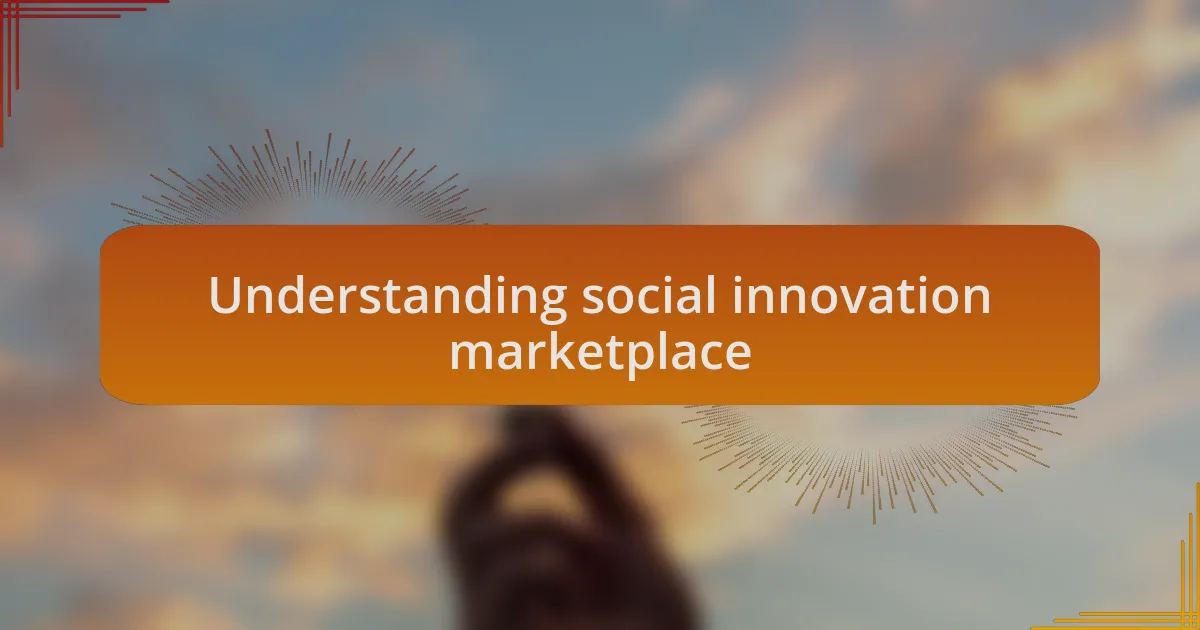
Understanding social innovation marketplace
The social innovation marketplace is a dynamic space where creative solutions meet pressing social challenges. I remember attending a local forum where passionate individuals came together, each sharing their unique initiatives designed to improve their communities. It struck me how these grassroots movements often started from simple ideas but flourished into impactful projects that addressed real issues.
At its core, this marketplace thrives on collaboration, allowing innovators to connect with resources, funding, and expertise. I once facilitated a workshop where diverse stakeholders shared their skills, transforming individual visions into collective action. Have you ever experienced the power of collaboration? It’s remarkable how collective brainstorming can elevate a single concept into a comprehensive strategy that resonates with many.
In understanding this marketplace, it’s essential to recognize its role in fostering resilience and adaptability among social entrepreneurs. I recall a conversation with a founder who faced setbacks yet found strength in feedback and partnerships, ultimately turning obstacles into opportunities. This journey of overcoming challenges isn’t just about the individual; it’s about creating a sustainable impact that can benefit society as a whole.
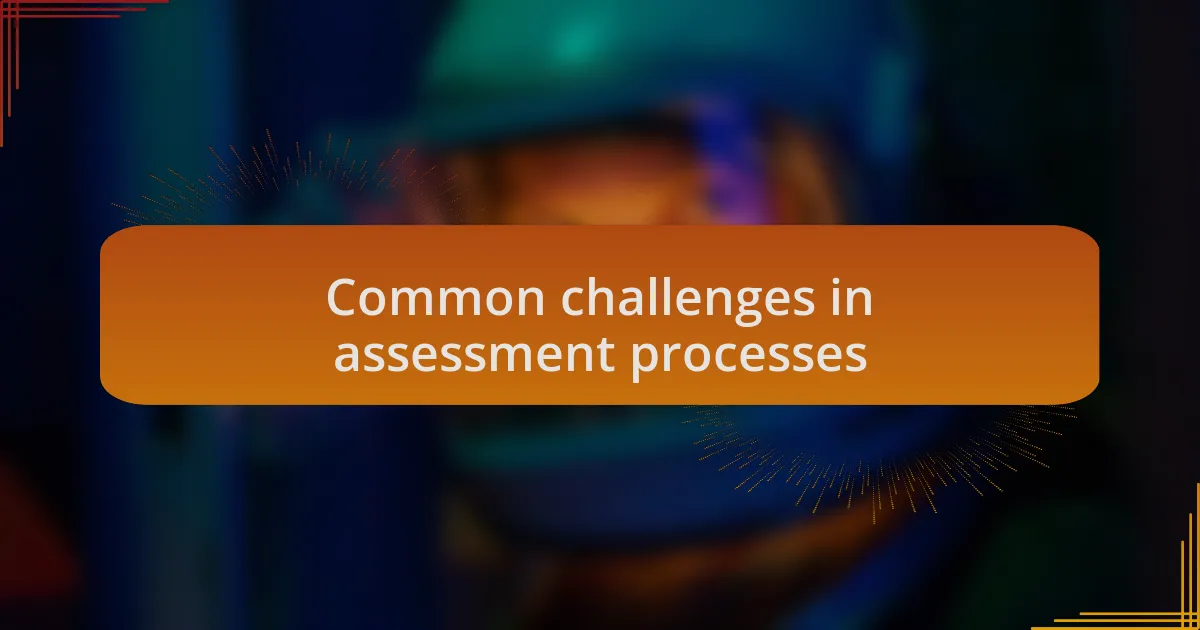
Common challenges in assessment processes
Assessment processes in the social innovation marketplace can be riddled with challenges. One hurdle I’ve often encountered is the subjective nature of evaluations. For instance, I remember receiving feedback on a proposal that seemed to vary wildly depending on who reviewed it. It made me ponder—how can we establish fair criteria that truly reflect the project’s impact rather than the reviewer’s personal bias?
Another significant issue is the difficulty in measuring impact. When I worked on a social program, quantifying our success wasn’t straightforward. We could track numbers, like people served or funds raised, but translating these into genuine community change was more elusive. This experience made me realize that qualitative assessments can provide deeper insights but often get overlooked in favor of numerical data. Have you faced this dilemma of balancing hard metrics with heartfelt stories in your assessments?
Lastly, time constraints can severely limit the assessment process. I vividly recall preparing for a critical evaluation where we had just a week to collate data, gather testimonials, and present a comprehensive narrative. The pressure was immense, and I found myself questioning whether we could truly capture the essence of our work under such tight deadlines. It struck me that we need to advocate for more reasonable timelines to accurately reflect the complexities of our initiatives.
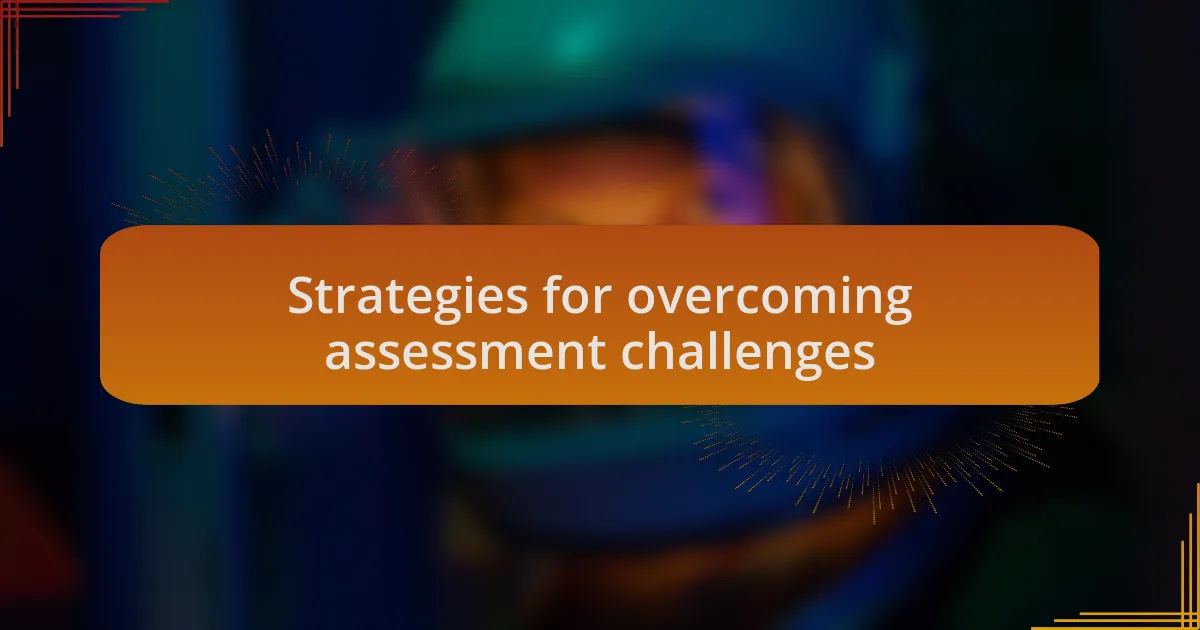
Strategies for overcoming assessment challenges
One effective strategy I’ve employed is developing clear, standardized evaluation criteria. When I faced inconsistent feedback on my initiatives, I collaborated with my team to create detailed guidelines that outlined what success looked like for each project. This not only minimized bias but also ensured that every reviewer was on the same page. Have you ever felt relieved when everyone shares the same understanding?
Engaging stakeholders in the assessment process can also yield tremendous benefits. In my past projects, I invited beneficiaries to share their perspectives during evaluations. Their stories illuminated aspects of impact I hadn’t considered, adding richness to our findings. It made the assessment feel more inclusive and reflective of real-life experiences. How often do we take the time to truly listen to those we aim to serve?
Lastly, prioritizing time management is key to overcoming time constraints. I once implemented a project timeline with built-in buffers for data collection and reflection, which turned out to be a game changer. Instead of rushing through processes, we dedicated time for thoughtful analysis, allowing us to capture the true essence of our achievements. How might your assessments improve with a little extra breathing room?
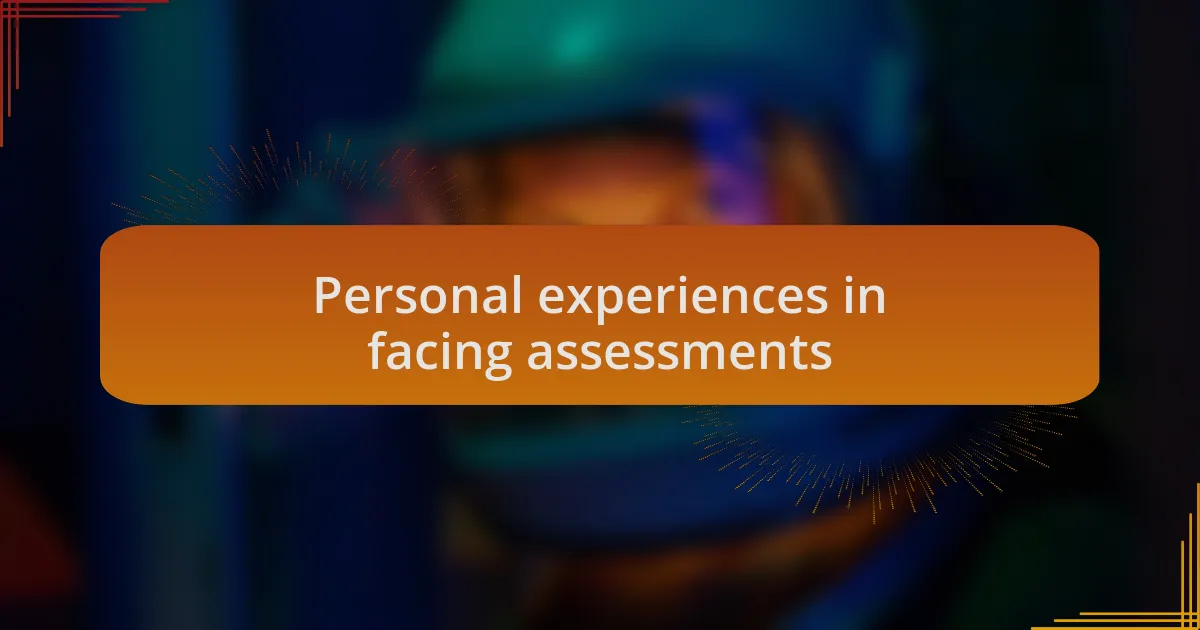
Personal experiences in facing assessments
Before diving into assessments, I often faced an internal struggle, questioning whether my work would meet expectations. I remember a specific project where I felt enormous pressure to deliver impressive results. During the evaluation, I realized I was more focused on avoiding failure than on showcasing my growth. Ever felt that weight on your shoulders?
In another instance, the feedback I received from an assessment left me bewildered. The comments felt vague and at times contradictory. It was a moment of frustration. I decided to schedule a follow-up discussion with the evaluators to clarify their points, which turned out to be incredibly enlightening. Have you ever turned confusion into clarity by simply asking the right questions?
Emotional challenges also played a role in my assessment experiences. I recall feeling disheartened when my work was misunderstood. However, I recognized that I could advocate for my project narrative. This shift in perspective transformed my approach to assessments; it became less about defending my work and more about sharing its true story. Isn’t it fascinating how reframing a situation can unleash confidence?
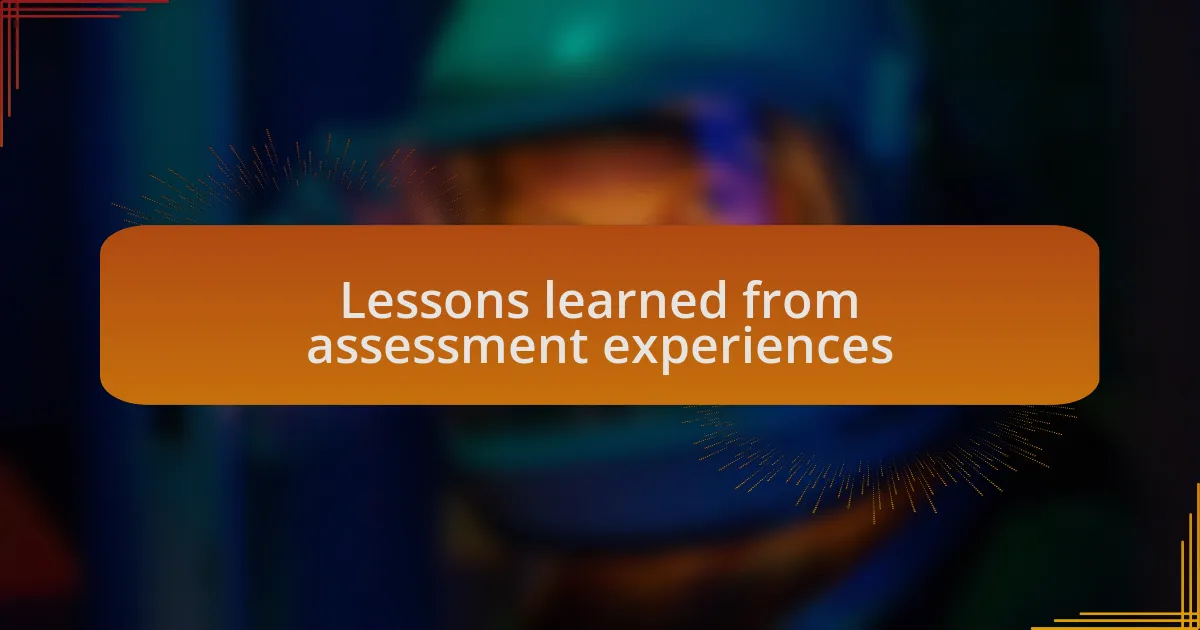
Lessons learned from assessment experiences
Evaluating my assessment experiences taught me the importance of preparation. I remember a time when I hurried through a project, believing that speed would impress the evaluators. However, the end result was a stark reminder that a solid foundation of research and thoughtful presentation makes all the difference. Have you ever felt that rush only to realize it didn’t yield the expected outcomes?
Another lesson emerged from a collaborative assessment where team dynamics played a crucial role. I found that my ability to communicate openly with my peers significantly impacted the assessment outcomes. When we began sharing our individual views before the evaluation, we not only strengthened our project but also built trust within the team. Isn’t it remarkable how embracing vulnerability can lead to a more meaningful collaboration?
Lastly, I discovered that embracing feedback is a cornerstone of growth. Early in my journey, I dreaded criticism, viewing it as a personal attack. Over time, I learned to shift this mindset; I now see feedback as an opportunity to refine my skills and broaden my perspective. Do you remember the last time you received constructive feedback and found it to be a powerful catalyst for growth?
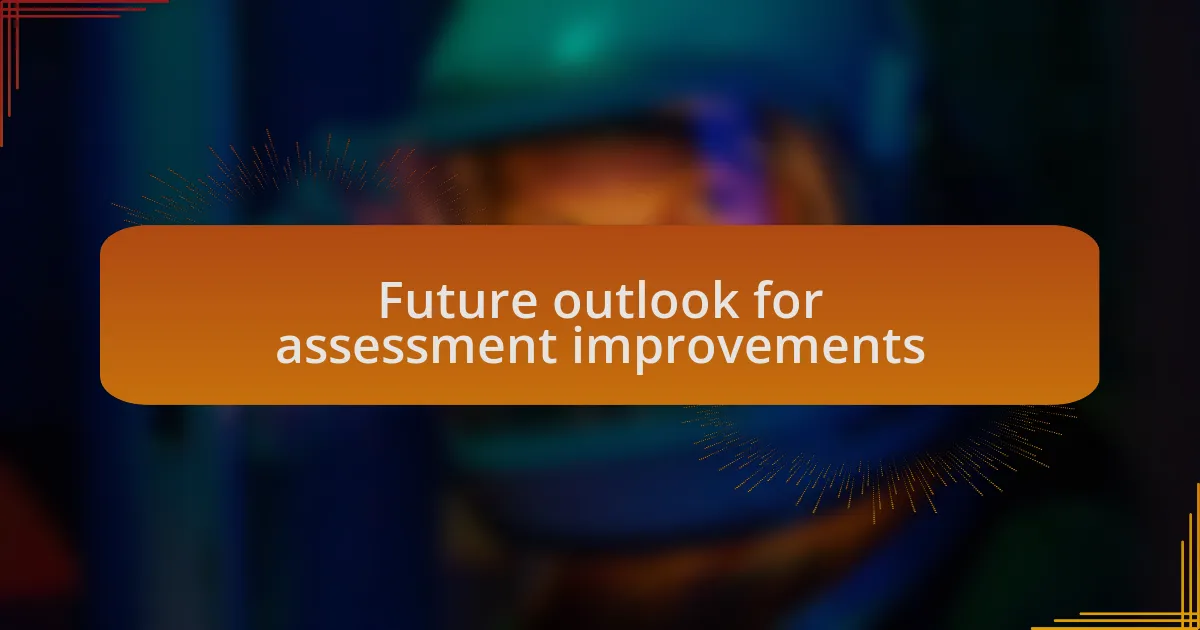
Future outlook for assessment improvements
Imagine a future where assessment methods evolve to be more inclusive and holistic. I envision tools integrating technology that not only evaluates performance but also captures individual learning journeys. Wouldn’t it be empowering if assessments could reflect both outcomes and the processes behind them?
I see a potential shift towards peer assessments, where individuals can provide insights based on their experiences. From my own encounters with peer feedback, I’ve found that it often resonates more deeply than traditional evaluations. Have you ever felt that your colleagues understood your work better than a distant evaluator could? Leveraging this dynamic could enrich the assessment landscape and foster a culture of continuous improvement.
Moreover, I believe data analytics will play a pivotal role in shaping future assessments. By harnessing trends and patterns in performance, evaluators can tailor feedback in real-time, addressing gaps before they widen. This proactive approach could transform assessments into growth experiences rather than mere evaluations. How motivating would it be to receive targeted guidance just when you need it most?